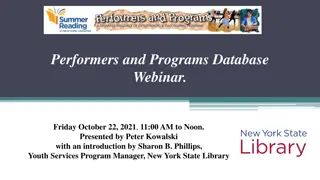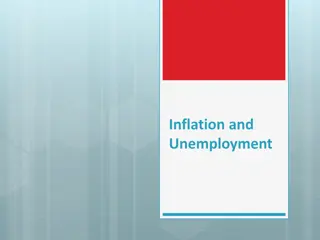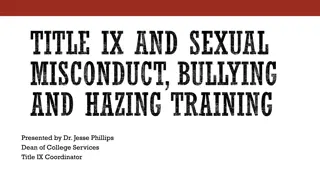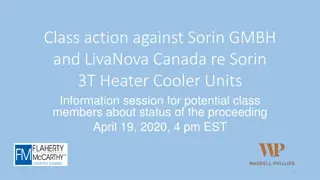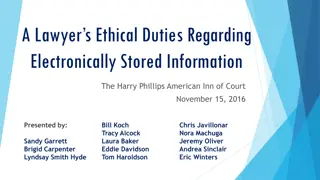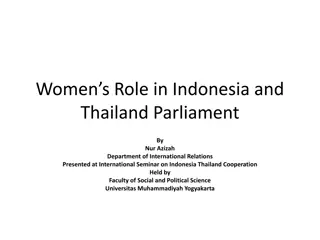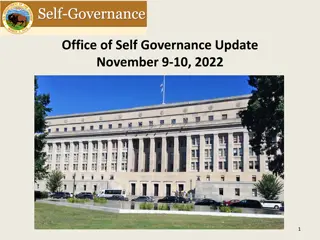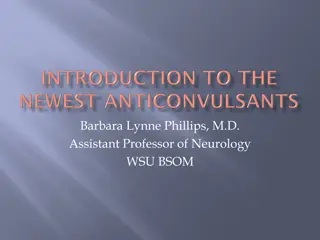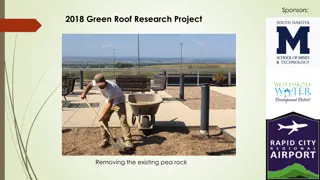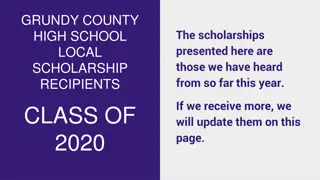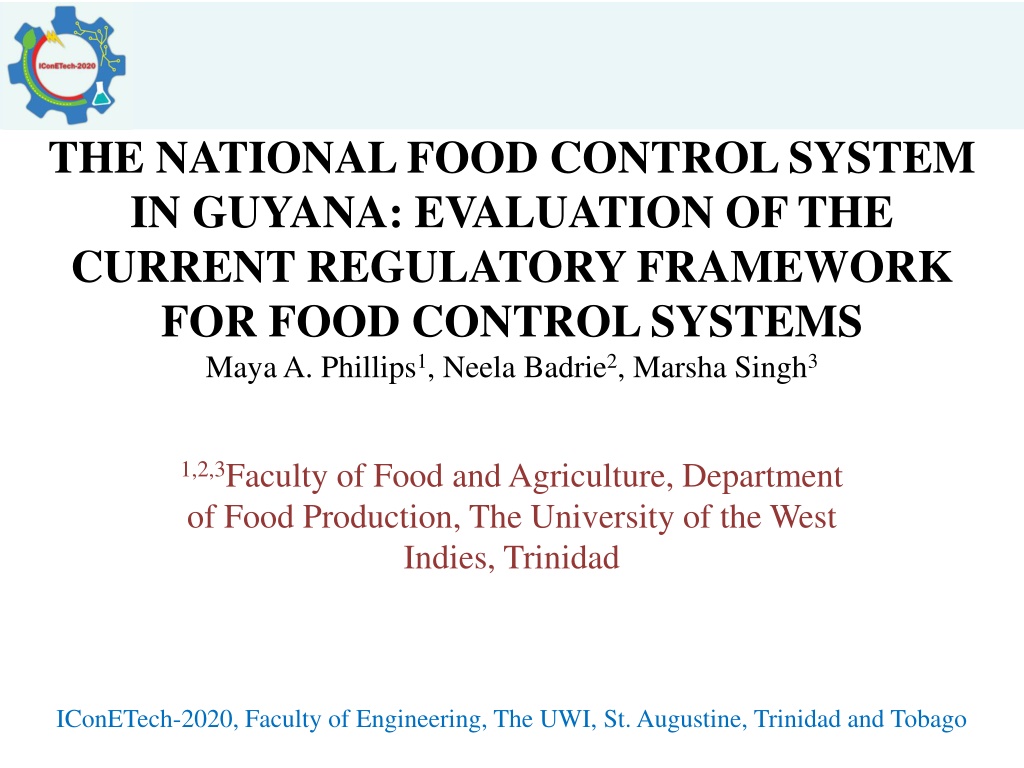
Evaluation of Guyana's National Food Control System
An evaluation of Guyana's current regulatory framework for food control systems reveals a fragmented, multiple-agency system. The study assesses agencies involved in food control, overlaps in responsibilities, gaps in the system, and weaknesses in the regulatory framework. Data was gathered through interviews with stakeholders and analysis of food laws, regulations, and archival documents.
Download Presentation

Please find below an Image/Link to download the presentation.
The content on the website is provided AS IS for your information and personal use only. It may not be sold, licensed, or shared on other websites without obtaining consent from the author. If you encounter any issues during the download, it is possible that the publisher has removed the file from their server.
You are allowed to download the files provided on this website for personal or commercial use, subject to the condition that they are used lawfully. All files are the property of their respective owners.
The content on the website is provided AS IS for your information and personal use only. It may not be sold, licensed, or shared on other websites without obtaining consent from the author.
E N D
Presentation Transcript
THE NATIONAL FOOD CONTROL SYSTEM IN GUYANA: EVALUATION OF THE CURRENT REGULATORY FRAMEWORK FOR FOOD CONTROL SYSTEMS Maya A. Phillips1, Neela Badrie2, Marsha Singh3 1,2,3Faculty of Food and Agriculture, Department of Food Production, The University of the West Indies, Trinidad IConETech-2020, Faculty of Engineering, The UWI, St. Augustine, Trinidad and Tobago
INTRODUCTION A well-functioning national food control system: protects public health and consumers increases a nation s food security builds international credibility (FAO and WHO 2003) IConETech-2020, Faculty of Engineering, The UWI, St. Augustine, Trinidad and Tobago
LITERATURE REVIEW Organisational arrangements for food control systems: single agency system multiple agency system integrated system (Al-Kandari and Jukes 2012) IConETech-2020, Faculty of Engineering, The UWI, St. Augustine, Trinidad and Tobago
OBJECTIVES To determine: agencies involved in food control in Guyana overlaps in their responsibilities gaps in the food control system weaknesses in the current regulatory framework IConETech-2020, Faculty of Engineering, The UWI, St. Augustine, Trinidad and Tobago
METHODOLOGY Scope of Research food laws and regulations Data sixteen (16) interviews with key stakeholders secondary data sources: Acts of Parliament archival documents IConETech-2020, Faculty of Engineering, The UWI, St. Augustine, Trinidad and Tobago
METHODOLOGY Analysis of Data hand written notes of key points stakeholders confirm accuracy further investigation using archival documents information presented according to themes: - gaps - overlaps -weaknesses IConETech-2020, Faculty of Engineering, The UWI, St. Augustine, Trinidad and Tobago
RESULTS The National Food Control System in Guyana is a fragmented, multiple agency system. IConETech-2020, Faculty of Engineering, The UWI, St. Augustine, Trinidad and Tobago
RESULTS Agencies involved in Food Control in Guyana two (2) in the Ministry of Public Health ten (10) in the Ministry of Agriculture one (1) each in the Ministries of: - Business - Finance - Communities - The Presidency IConETech-2020, Faculty of Engineering, The UWI, St. Augustine, Trinidad and Tobago
RESULTS Overlaps in Responsibilities Laboratory Infrastructure Government Analyst-Food and Drug Department (GA-FDD) is the national laboratory The Fish Industry The Meat Industry IConETech-2020, Faculty of Engineering, The UWI, St. Augustine, Trinidad and Tobago
RESULTS IConETech-2020, Faculty of Engineering, The UWI, St. Augustine, Trinidad and Tobago
RESULTS 2015: Fisheries Department notified by FSIS 2018: ban imposed by the USDA Which agency was at fault? VPHU was responsible for satisfying US requirements IConETech-2020, Faculty of Engineering, The UWI, St. Augustine, Trinidad and Tobago
RESULTS Guyana lost a valuable market for all Siluriformes fish (catfish) 2018 US Fish Ban included: Sciades parkeri (Gilbacker sea catfish) Hoplosterum sp. locally known as Hassa Sciades proops locally known as Cuirass IConETech-2020, Faculty of Engineering, The UWI, St. Augustine, Trinidad and Tobago
RESULTS Gaps in the Food Control System skills gap no database for sharing information slow surveillance system paper base documentation poor harmonization of standards lack of adequate quarantine facilities lack of robust traceability systems IConETech-2020, Faculty of Engineering, The UWI, St. Augustine, Trinidad and Tobago
RESULTS Communication Pathways informal personal Recommendation: Memoranda of Understanding (MOU) between agencies IConETech-2020, Faculty of Engineering, The UWI, St. Augustine, Trinidad and Tobago
RESULTS Personnel lack of trained personnel in food control Recommendations: expand the human resource capacity employ food safety specialists IConETech-2020, Faculty of Engineering, The UWI, St. Augustine, Trinidad and Tobago
RESULTS The Food Authority Guyana lacks a functional Food Authority Recommendations: establish a Ministry of Food Production IConETech-2020, Faculty of Engineering, The UWI, St. Augustine, Trinidad and Tobago
ADDITIONAL RECOMMENDATIONS national policy for genetically modified (GM) foods certifies public abattoirs establish quarantine facilities and regulations develops baseline data for heavy metals establishes a functional Food Safety Authority improves laboratory infrastructure IConETech-2020, Faculty of Engineering, The UWI, St. Augustine, Trinidad and Tobago
REFERNCES FAO and WHO (Food and Agriculture Organization of the United Nations and World Health Organization). 2003. Assuring Food Safety and Quality: Guidelines for Strengthening National Food Control Systems. FAO Food and Nutrition Paper 76. Al-Kandari, Dina and David J. Jukes. 2012. The Food Control System in Saudi Arabia-Centralizing Food Control Activities. Food Control 28(1): 33-46 Guyana. House of Assembly. 2002. Fisheries Act, 2002. Guyana. House of Assembly. 2003. Fisheries Product Regulations, 2003 IConETech-2020, Faculty of Engineering, The UWI, St. Augustine, Trinidad and Tobago
THANK YOU! IConETech-2020, Faculty of Engineering, The UWI, St. Augustine, Trinidad and Tobago

